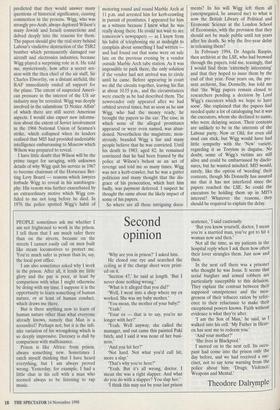Second opinion
PEOPLE sometimes ask me whether I am not frightened to work in the prison. I tell them that I am much safer there than on the streets, because on the streets I cannot easily call on men built like steam locomotives to protect me. You're much safer in prison than in, say, the local post office.
I am also sometimes asked why I work in the prison. After all, it lends me little glory and the pay is poor, at least by comparison with what I might otherwise be doing with my time. I suppose it is the opportunity to learn something of human nature, or at least of human conduct, which draws me there.
But is there anything new to learn of human nature other than what everyone already knows, namely that Man is a scoundrel? Perhaps not; but it is the infi- nite variation of his wrongdoing which is so deeply impressive. Decency is dull by comparison with malfeasance.
Prison is like Africa: from prison, always something new. Sometimes I catch myself thinking that I have heard everything, but I am always proved wrong. Yesterday, for example, I had a little chat in his cell with a man who seemed always to be listening to rap music. `Why are you in prison?' I asked him.
He closed one eye and searched the ceiling as if the charge sheet were print- ed on it.
`Section 47,' he said at length. 'But I never done nothing wrong.'
`What is it alleged that you did?'
`Well, I went into a shop where my ex worked. She was my baby mother.'
`You mean, the mother of your baby?' `Yeah.'
`Your ex — that is to say, you're no longer with her?'
`Yeah. Well anyway, she called the manager, and out came this painted Paki bitch, and I said it was none of her busi- ness.'
`And you hit her?'
`Not hard. Not what you'd call hit, more a slap.'
`That's why you're here?'
`Yeah. But it's all wrong, doctor. I mean she was a right slapper. And what do you do with a slapper? You slap her.'
`I think this may not be your last prison sentence,' I said cautiously.
`But you know yourself, doctor, I mean you're a married man, you've got to hit a woman now and then.'
Not all the time, as my patients in the hospital reply when I ask them how often their lover strangles them. Just now and then.
In the next cell there was a prisoner who thought he was Jesus. It seems that serial burglars and armed robbers are particularly susceptible to this delusion. They explain the contrast between their supposed omnipotence and the mea- greness of their tobacco ration by refer- ence to their reluctance to make their exceptional powers known. Faith without evidence is what they're after. `I am the Son of Man,' he said, as I walked into his cell. 'My Father in Heav- en has sent me to redeem you.'
`And your mother?'
`She lives in Blackpool.'
I moved on to the next cell. Its occu- pant had come into the prison only the day before, and we had received a suc- cinct, not to say terse warning from the police about him: 'Drugs; Violence; Weapons and Mental.'
Theodore Dalrymple


















































































 Previous page
Previous page